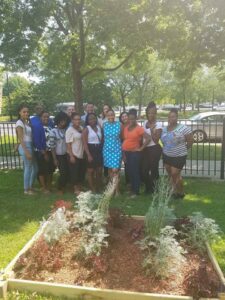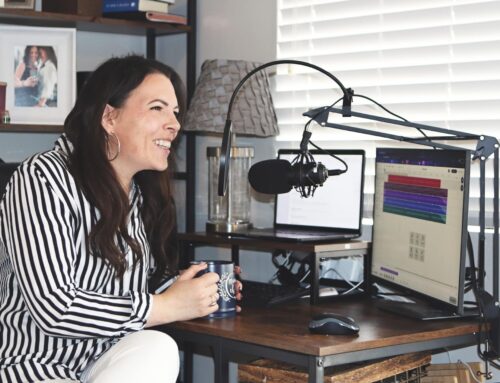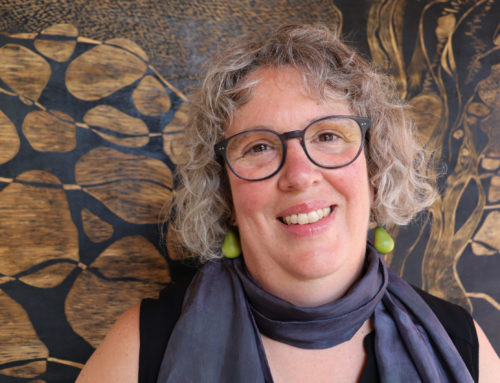 In our ongoing campaign to bring you inspirational stories about people who have transformed themselves and their lives, we are pleased to introduce you to Lillian Harris. She is the founder of Advocates for Adolescent Mothers, an organization dedicated to empowering young parents to break the cycle of poverty. Lillian is a Chicago native, as well as a former teen mom herself.
In our ongoing campaign to bring you inspirational stories about people who have transformed themselves and their lives, we are pleased to introduce you to Lillian Harris. She is the founder of Advocates for Adolescent Mothers, an organization dedicated to empowering young parents to break the cycle of poverty. Lillian is a Chicago native, as well as a former teen mom herself.
As a teenager, Lillian endured the hardships of homelessness, poverty, and motherhood, to become a successful entrepreneur and philanthropic leader.
As a nonprofit management professional, Lillian has been championing the empowerment of young parents since 1997. In addition to her work with youth, Lillian is also a business owner, licensed Realtor and managing broker. She has been honored with a national award from the Healthy Teen Network and the Beauty In Beauty Out Tour, as well as local awards from organizations such as WNBA Chicago Sky, Zeta Phi Beta Xi Mu Zeta sorority, and the Top Ladies of Distinction organization.
Read on to learn what inspired Lillian to help others, and how she transformed her impoverished upbringing into a story of hope, focus, and determination.
Balodana: What was the catalyst for your transformation experience?
Lillian: My transformation started when I recognized I was living in poverty. When I think about poverty, I envision being at the bottom of a deep hole, trying to dig out. The circumstances and situations that come with being poor can bury you further. For example, being born poor, then becoming pregnant at a young age pushes you deeper into the hole. Often, the circumstances faced by many people who are poor, results in them living in survival mode, which can result in them making choices that also results in them slipping further into that hole.
Where I grew up, poverty was normalized. It is difficult to realize that you are living in poverty if you haven’t been exposed to anything else [or anything different]. Like many children who live in poverty, I didn’t realize I was poor. When I became pregnant, I went through a period of denial about the pregnancy. When I finally accepted the reality that I was indeed pregnant, I began to think about the quality of life I wanted to provide my child; I didn’t want my child to go through what I had gone through as a child. It was through this thought process that I realized that I lived in poverty. I knew there was nothing I could do to prevent my son from being born in poverty, but I knew that I didn’t have to raise him in poverty. And so it became my mission to achieve economic stability, so that my son and I would not continue to live in poverty.
Early on, I decided that earning a college degree would be the best way to escape poverty. If I were going to go to college, I needed to begin taking my high school education seriously. I had always been smart, I was even in “gifted” classes much of the time that I was in grammar school, and I had advanced placement classes in high school. However, once I got to high school, I stopped taking my education seriously because I wasn’t being challenged; there were many extra curricular activities I couldn’t participate in due to my family being poor; and I started to desire to feel loved in a way that was meaningful to me, which is something I wasn’t getting from home. The choices I made as a result of these things are what resulted in me becoming pregnant.
After rededicating myself to my education, I earned all A’s, finishing my final year of high school at alternative school. Although I had completed 4 years of high school, I did not earn a traditional diploma, and that always bothered me. I didn’t want my last memory of a commencement ceremony to be my 8th grade graduation. That is also something that continued to motivate me to finish college, despite the many obstacles I faced while I was a college student. Originally I had hoped to earn my bachelors degree before my son entered kindergarten, but my college journey took longer than I anticipated. There were times when I struggled and when I wanted to give up, but I stayed strong and kept going.
Balodana: How did your transformation affect the people around you?
Lillian: It’s been challenging. I am one of 7 kids. I am the first and only person in my family to earn a bachelor’s degree. It’s still hard. I learned I had to set goals; I became very ambitious. I have been described as “an intense chick.” I have a hard time relaxing, but I am comfortable and happy with who I am. I believe in tough love, which has at times caused tension between myself and family members. I feel a bit ostracized sometimes because leaving poverty also meant I was doing something that was outside of the ordinary.
Balodana: What was the most difficult or memorable part of your transformation?
Lillian: Trying to crawl out of poverty was the most difficult part of my experience. After the initial “aha” moment, I had to focus all my energies on my goal, and my living situation was not always stable.
I first experienced homelessness as a child, when my mother moved us into a shelter for battered women. My son and I were also homeless several times during the pursuit of my undergraduate degree. A few times my mother put me out for breaking curfew with a boyfriend. During one of these times, I enrolled in a residential program for teen moms. I was there for a short period of time, but that program planted the seed for Advocates for Adolescent Mothers.
Once, when my son was about 5-years-old, my son and I were sitting on the porch of the 2-flat apartment building we lived in. I thought about how I didn’t realize as a child that I was living in poverty, and I didn’t want my son to be blind to that reality, as I was as a child. To change our circumstances, we must first understand what those circumstances are. So I asked him, “Did you know we are poor?” He looked at me as though he was shocked, and said no. He wondered aloud, “How could we be poor when we have this apartment, we have a car….”. We had a pretty nice apartment, I had a decent car, and I was working as a pharmacy technician while also working toward earning my bachelor’s degree. He didn’t know my struggle, but we were struggling. I told him that we were poor and that the way we were living was not what we were striving for; it wasn’t success.
It took me 6 years, but I eventually earned my bachelor’s degree, and 2 years later, I earned a master’s degree from the University of Chicago. I later made a career transition, and ten years later, I earned a second master’s degree from Roosevelt University.
 Balodana: Did your personal style or wardrobe change to reflect your transformation?
Balodana: Did your personal style or wardrobe change to reflect your transformation?
Lillian: Having been born and raised in poverty, I didn’t always have the things I wanted. I was usually wearing “hand-me-downs”, and I never had name brand clothes. As I got older, I learned to improvise with what I had, and add my own flair to the clothes that I could get my hands on. At one time during my childhood, my father was a “peddler” who sold socks and other necessities on the street. He saved up money to buy clothes and eventually established a storefront where he sold popular knock-off brand clothing, purses, and other accessories. He dressed nicely, and would often wear name brand clothing. As a teen, I began to borrow and wear his clothes. I would put my own spin on his clothes to make the outfits look more feminine.
As I began to earn more money, I took pride in being able to dress more fashionably. I made great efforts to ensure that I wouldn’t be seen wearing something that someone else had worn; I didn’t want to go out and see someone else wearing the same thing I had on.
My wardrobe became slightly more conservative as I made a career transition from social work to real estate. I was one to wear very high heels and I began to tone that down a little bit.
Balodana: What piece of clothing do you find most empowering?
Lillian: My go-to in a professional setting is a sheath dress – versatile and comfortable, but well-fitted. I layer it with a nice blazer (I have different styles and colors to fit the occasion) and complete the look with a pair of pumps or fashionable high heels.

Balodana: What would you say for others who may be having a hard time adapting to changes and/or opportunities?
Lillian: Ask yourself if you’re doing your best. If the answer is no, ask yourself if you’re “trying hard”. More times than not, you will be at least “trying hard”, and if that is the case, allow yourself some grace. If you are doing your best, there’s no need for you to fret, because you can’t do better than your best.
I participated in several teen mom programs when I was a teen mom. The director of one of those programs always reminded me [after I had earned my bachelor’s degree] that I would often say, “I just gotta stay focused”. It’s amazing that she remembered that I said that [maybe it was inspiring to her], because I didn’t remember saying it, but that was exactly what I did that helped me make it through trying times–I stayed focused. When I was homeless and staying in a shelter, I tried not to focus on the fact that my son and I were living in this shelter, sleeping among strangers; I stayed focused on the end goal, earning my degree, and my anticipated future.
Balodana: Tell us more about Advocates for Adolescent Mothers?
Lillian: Advocates for Adolescent Mothers is a non profit whose mission is to empower young parents by providing them with the tools, resources, and support needed to break the cycle of poverty, establish prosperity, and prevent child abuse. Because most people who grow up impoverished don’t realize that they are poor, what we do requires being mindful of how we market our goals to young mothers, as well as to our donors.
Our Educational Empowerment Program provides mentoring and financial support to college enrolled moms to help them manage the dual roles of being a mom and a student, while imparting knowledge to prevent situations that may put their child at risk of abuse. Our participants’ accomplishments have included becoming college graduates with bachelor’s and master’s degrees; beginning promising careers where their incomes have resulted in them escaping poverty; achieving homeownership; and becoming married.
Though the program originally centered around the pursuit of a traditional college degree, we are planning to expand our program offering since the cost of college attendance has become so exorbitant. We will also help parents earn a trade or even create a small business. We do not have a residential program yet, but we do have a big toy drive at Christmas through which we have provided thousands of toys and coats to hundreds of young families, to help ease their financial burdens around the holiday season.
If we think critically about breaking the cycle of poverty, child abuse and teen pregnancy are correlated. Poverty puts people in survival mode. There are few opportunities to enjoy and plan life, to set goals, and when parents are in a survival mode, it leads to kids looking elsewhere for love and emotional support. These conditions set the stage for the same situations I found myself in as a teen, that led to me becoming pregnant. Ultimately my goal is to be able to do more to help others break free from the poverty cycle, but I am doing my best and, following my own advice, I must allow myself a bit of grace.

You can find out more about Lillian and AFAM at these links:
https://advocatesforadolescentmothers.com/
https://www.facebook.com/AFAM.NFP/
https://instagram.com/afam_nfp
https://www.linkedin.com/company/advocates-for-adolescent-mothers/
https://www.youtube.com/user/AFAMNFP
One of Balodana’s core values is celebrating all of life’s stages, ups and downs, triumphs and tragedies. With this series of interviews with powerful people who have gone through a transformative experience, we hope to inspire you and energize you through your own transformation. If you know someone who has a great transformation story to tell, nominate them! Send to [email protected].


